Argentina narrowly prevailed 1-0 in Sunday’s Copa América Final against Colombia, with substitute Lautaro Martínez sealing the deal in the 112th minute and avoiding a penalty shootout in Miami. Whilst Colombia were unable to end a victorious era for the Albiceleste, one cycle did come to an end in Florida: Ángel Di María’s time with the Argentina national team.
By Zach Lowy
Humble Beginnings in Argentina
Whilst Di María may not be regarded in the same vein as compatriots Lionel Messi and Diego Maradona when it comes to the greatest footballers of all time, he will nevertheless go down as one of the most clutch footballers in the history of the sport. A player who rises to the occasion in the most decisive moments, who shines the beacon in the most turbulent of storms, and who, no matter how hot the emotions are running, always retains ice in his veins. Call it clutch or divine intervention, it has been with him since he was a toddler – one day when he was three years old, Di María had wandered onto the street in his stroller and came within inches of getting hit by an oncoming car, only for his mother to rush out of their house and push him out of the way.
Growing up on the mean streets of Rosario, Di María helped his father bag charcoal so that he could sell it on the market, and whenever his boots came apart, his mother would glue them back together. Desperate for a career that could shepherd his family out of poverty, Di María continued to hone his skills at Rosario Central’s academy after joining the club at the age of three, but by the time he was 16, his development seemed to have reached a standstill. His father handed him an ultimatum: return to his academic studies, work alongside him in his charcoal business, or break into Rosario’s first team within a year. With just weeks remaining in their agreement, Di María finally made his professional debut on December 14, 2005.
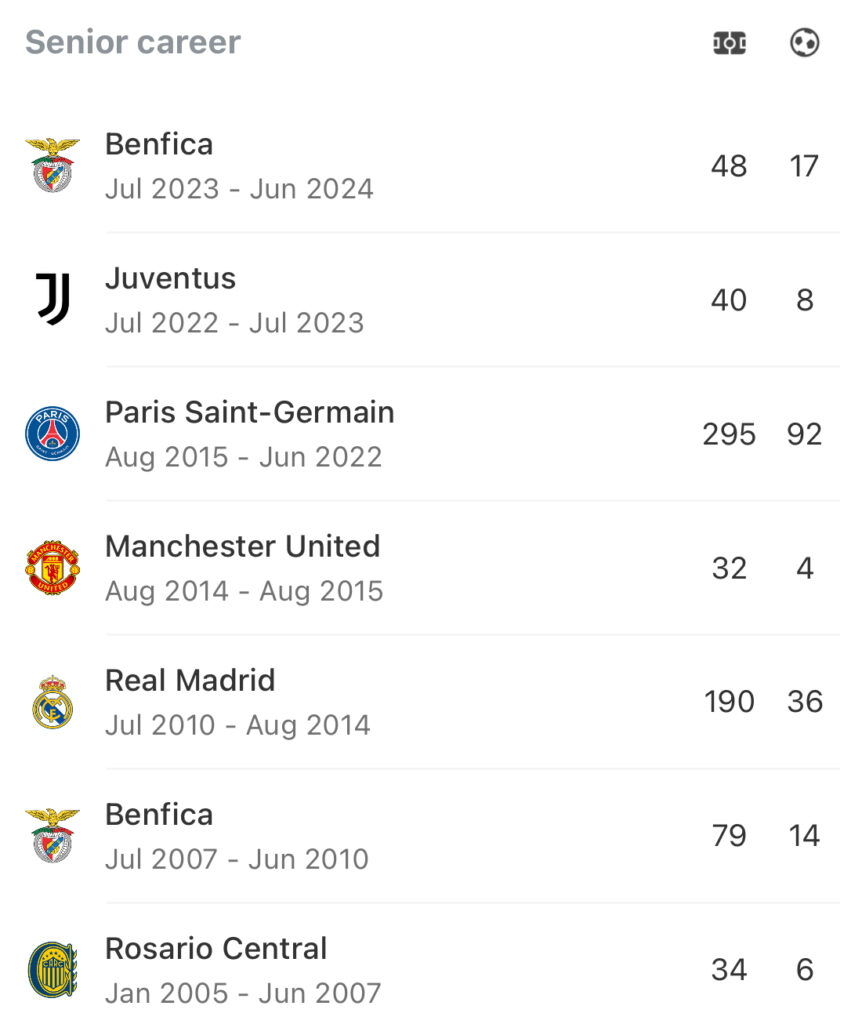
Di María registered 6 goals and 2 assists in 39 total appearances for his boyhood club, but it wasn’t until 2007 that his first huge break came. Playing alongside future Albiceleste internationals like Sergio Romero and Sergio Agüero, Di María led Argentina to glory in the U-20 World Cup, and his stellar tournament caught the attention of Benfica, who signed him for an initial fee of €6 million. The lanky teenager from Santa Fe had finally hit the big time – he was going to be playing for one of the most successful teams in Europe. He bought a house for his mother and sisters, and asked his father to quit his job and move with him to Lisbon, where he made 44 appearances in his debut campaign.
One year after guiding Argentina to the title in Canada, Di María headed to China and made a name for himself in the Summer Olympics. With the score level in the 105th minute, Di María latched onto a through ball from Lionel Messi and evaded the lunging tackle of a Dutch defender before sliding it into the bottom right corner of the net. Argentina were going to the semifinals, where they would annihilate Brazil 3-0 and set up a date with Nigeria in the final. With an opportunity for the gold medal on the line, Di María once again made the difference, picking up a pass from Messi in the 58th minute and hustling from the centre circle all the way to the edge of the box before chipping the incoming Nigerian goalkeeper with the grace and composure of a veteran forward. As the rest of the players waited with bated breath to see if the ball would trickle in, Di María was already relishing the moment, with arms wide open and a mile-wide grin that spread like wildfire throughout the traveling Albiceleste support in Beijing.
Road to Superstardom
Di María’s father broke both of his knees as a youngster, whilst his grandfather lost both of his legs in a train accident. His patriarchal role models were unable to pursue their footballing dreams due to grave injuries, but as for Di María, he has been blessed with the luck of not having to cope with lengthy spells on the sidelines. According to Transfermarkt, Di María has not missed more than five weeks due to a single injury (apart from a 52-day spell in the summer of 2015).
“My dream was close to dying so many times” stated Di María in an interview with the Player’s Tribune. “But my father kept working under the tin roof, my mother kept pedalling, I kept running into space.”
Never one to take this good fortune for granted, Di María made the most of it and quickly cemented his reputation as one of the most promising wingers in football, leading Benfica to the 2009/10 Primeira Liga title and Taça da Liga title whilst also finishing as the top assist provider in the Portuguese league. It wasn’t long before Maradona was hailing him as Argentina’s next top superstar, with ‘El Pelusa’ calling him up for the 2010 World Cup in South Africa. Di María started four out of five matches as Argentina were sent packing from the tournament by Germany, and his impressive displays would draw the attention of Real Madrid, who signed him for €25 million plus €11 million in incentives.
After an inconsistent start to life in Spain, Di María was able to finally make some inroads in the 2011/12 campaign under José Mourinho, winning a place in the starting XI and scintillating the Santiago Bernabéu with his rapid dribbling and immaculate crossing. With Di María working his magic on the flanks, Real slammed the door shut on Barcelona’s dynasty, claiming a LaLiga record 100 points and 121 goals. Two years later, Di María was forced to adapt to a new role as an attacking midfielder in Carlo Ancelotti’s 4-3-3 following the arrival of Gareth Bale. Not only did he make the transition, but he thrived in the centre of the pitch, finishing as LaLiga’s top assist provider (17) and opening the scoring against Barcelona in their 2-1 win in the 2014 Copa del Rey Final. Di María returned to his former stomping grounds and delivered a Man of the Match performance in the UEFA Champions League Final, dribbling past a sea of Atlético Madrid defenders before forcing a point-blank save from Thibaut Courtois and giving Bale the chance to head home from close range in the 110th minute. Real won 4-1 at the Estádio da Luz, ending a 12-year wait for an elusive 10th Champions League title.
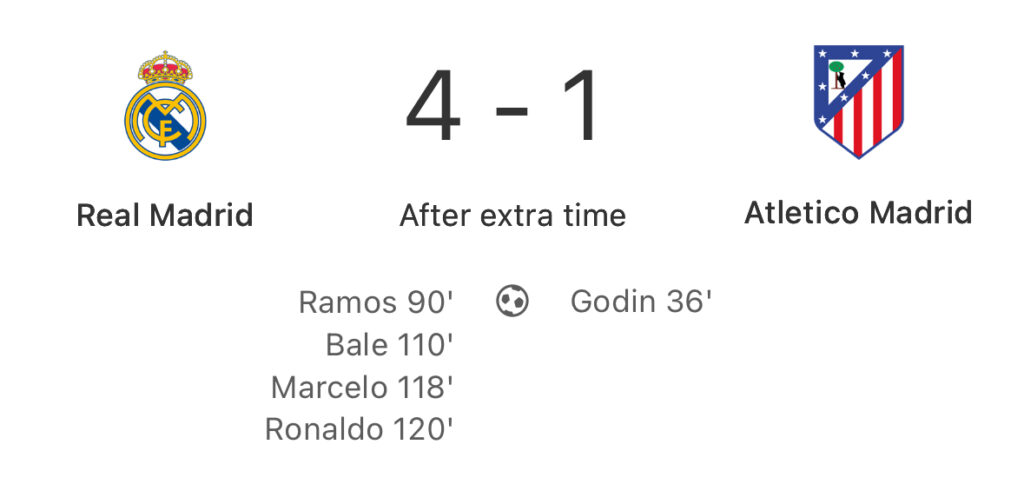
Di María headed to Brazil, where he would continue his big-game heroics by breaking the deadlock in the 118th minute of their Round of 16 match against Switzerland before assisting Gonzalo Higuaín’s goal in their quarterfinal tie. That same match, he injured his hamstring and missed out on the rest of the World Cup, with Germany prevailing 1-0 in the final courtesy of Mario Götze’s late winner. A few weeks later, Di María packed his bags for England and joined Manchester United for a Premier League record £59.7 million, with James Rodríguez’s arrival making him surplus to requirements at Real. However, he was never quite able to convince under Louis van Gaal and found himself on the move after one year in England, taking his talents to Paris Saint-Germain for £44 million.
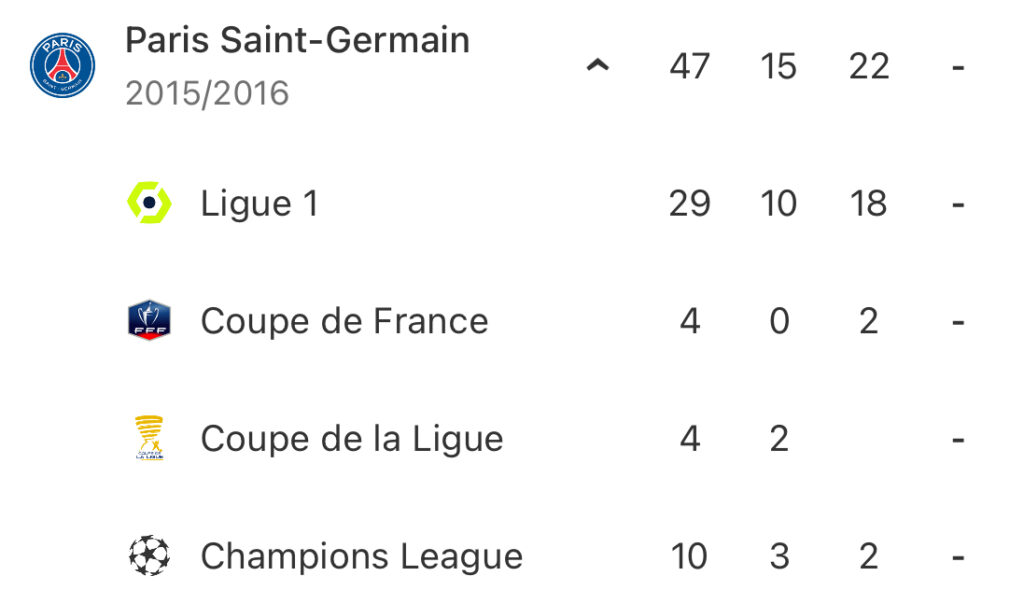
The Argentine quickly gained a new lease on life in France, setting a Ligue 1 record with 18 assists in the 2015/16 season and winning four domestic trophies. However, his improved fortunes failed to translate to the international level. For the third straight year, Di María picked up an injury midway through the tournament, and for the second straight year, he watched from the sidelines as Chile edged Argentina on penalties in the Copa América Final.
After the Storm Comes the Rainbow
Nicknamed “El Fideo” or “The Noodle” for his slender frame, it seemed that the only thing thinner than Di María body were his chances of winning a trophy with Argentina. More heartbreak and anguish ensued for Di María, with his Albiceleste side losing to eventual champions France and Brazil in the 2018 World Cup and the 2019 Copa América. And whilst he did add 19 trophies to his cabinet during his time at the Parc de Princes, he was unable to guide PSG to a maiden Champions League trophy. Six years after spurring Real Madrid to La Décima at the Luz, Di María’s PSG came up short and lost 1-0 to Bayern Munich in the 2020 final at the Luz. The following season, they lost to Manchester City in the semifinals and missed out on the Ligue 1 title to Lille on the final day of the campaign. Little did Di María know it, but redemption was just around the corner.
Argentina returned to the Copa América Final for the third time in four attempts, and apart from a 1-0 win vs. Paraguay in the group stage which saw him tee up Papu Gómez’s 10th-minute goal with an expertly timed through ball, Di María would come off the bench in four of Argentina’s first five fixtures. However, Lionel Scaloni would change his tune for the last match as Nicolás González dropped out for El Fideo. For the first time in 13 years, Di María was going to have the opportunity to contest an international final for Argentina.
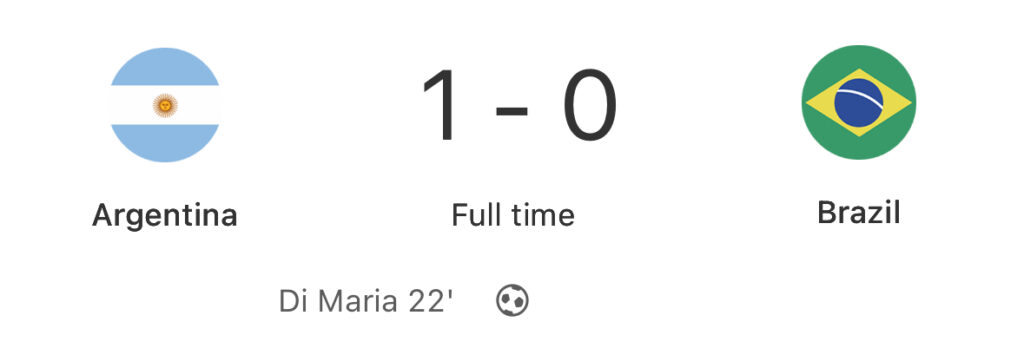
Going up against the host nation and the defending champion, Argentina took the advantage in the 22nd minute as Rodrigo de Paul sliced through Brazil’s defense with surgical precision, and when Renan Lodi failed to clear the danger, Di María was there to cushion the ball down and delicately chip it past the onrushing goalkeeper and into the back of the net. Argentina held on for their first senior trophy since 1993, kicking off a pattern of excellence that has remained until this day.
By the time the 2022 FIFA World Cup commenced in Qatar, plenty of things had changed: Di María and Leandro Paredes had swapped PSG for Juventus, Messi had left Barcelona for PSG, whilst De Paul had made the move from Udinese to Atlético Madrid. Argentina would begin the tournament by losing a World Cup opener for the first time since 1990, with a shocking defeat to Saudi Arabia throwing their silverware hopes into disarray. Unable to find a way past a resolute Mexico backline, it seemed that Argentina were headed for an early exit until the 64th minute as Di María attracted the attention of several green shirts before sliding the ball towards Messi, who obliged with a ferocious shot from distance. Argentina would go on to win 2-0 against Mexico and Poland to finish atop their group, but they suffered a damning blow as Di María incurred a muscle overload in his left foot. He managed just eight minutes in the quarterfinal against the Netherlands and didn’t suit up for either knockout round match vs. Australia and Croatia – it seemed that once again, Di María in an international final was a luxury that Argentina could not afford.
Eternal Greatness
Eight years before, Di María had been denied the opportunity of contesting a World Cup Final by Real Madrid, who had feared exacerbating his injury and jeopardizing a potential transfer. He wasn’t going to let anyone stop him this time.
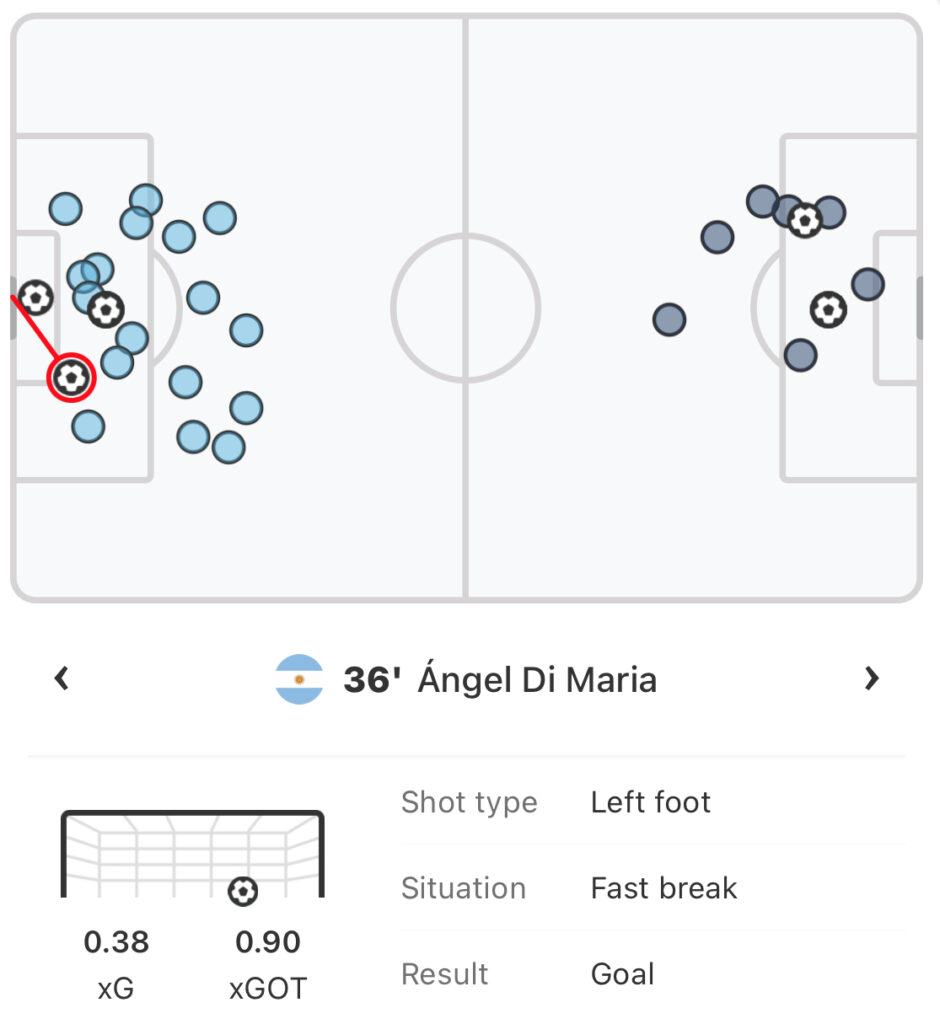
He ran rampant on the left flank and showed off his sensational close control and change of direction, and it didn’t take long before he had given Argentina the advantage, feigning to cross before maneuvering past Ousmane Dembélé and making a break for the box, where Ousmane elected to push him to the ground. Messi converted from the penalty spot whilst Di María doubled the lead before halftime, putting the finishing touches on a well-worked counter-attack and lasting until the 64th minute, before making way for Marcos Acuña. The next hour would see Messi and Kylian Mbappé trade blows like a pair of veteran prizefighters, but ultimately, it was Gonzalo Montiel’s penalty that sealed a historic victory for Argentina. After 36 years of heartbreak, Argentina were finally world champions.
Di María returned to Benfica in the summer of 2023 on a free transfer, racking up 17 goals and 15 assists in 48 appearances before heading to the United States for the Copa América. This time, his body cooperated: Di María started all but one match as Argentina returned to the biggest stage in South American football, scoring eight goals and conceding just once. Once again, Di María came up clutch in the final, completing six out of seven crosses, creating three chances, registering two shots on target and eight recoveries, and winning CONMEBOL’s Player of the Match. With Messi hobbling off in the second half due to an ankle injury, Di María held down the fort and led the line with customary poise and dynamism until Martínez finally opened the scoring against Colombia in extra time. Desperate to shore up the backline and protect their lead, Scaloni subbed Di María off for Nicolás Otamendi for the final minutes of his international swan song. As Sunday turned into Monday in Miami, Di María walked out with his teammates for the final time and basked in the splendor of the occasion.
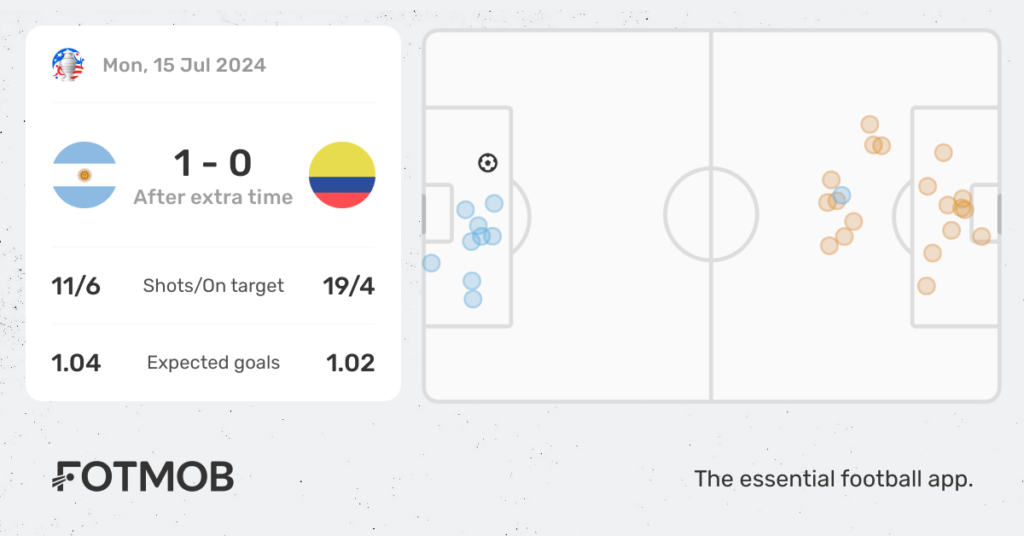
At 36 years of age, El Fideo leaves behind a monumental legacy for club and country: only Messi (187) and Javier Mascherano (147) have more caps than Di María (145), only Messi (55) has more assists than him (29), whilst only Messi (109), Gabriel Batistuta (56), Agüero (41), Hernán Crespo (35) and Maradona (34) have scored more than Di María (31). Moreover, only Cristiano Ronaldo (42) and Messi (40) have racked up more assists in the UEFA Champions League than Di María (39). It remains to be seen whether or not Di María will renew his contract at Benfica and attempt to leapfrog his two former teammates in the assist charts, or if he will depart his club on a free transfer for the third straight year and pursue a new opportunity outside of Europe, but one thing’s for sure: Ángel Di María will go down as one of the greatest players of his generation.
(Cover image from IMAGO)
You can follow every Argentina game live with FotMob — featuring deep stats coverage, xG, and player ratings. Download the free app here.
